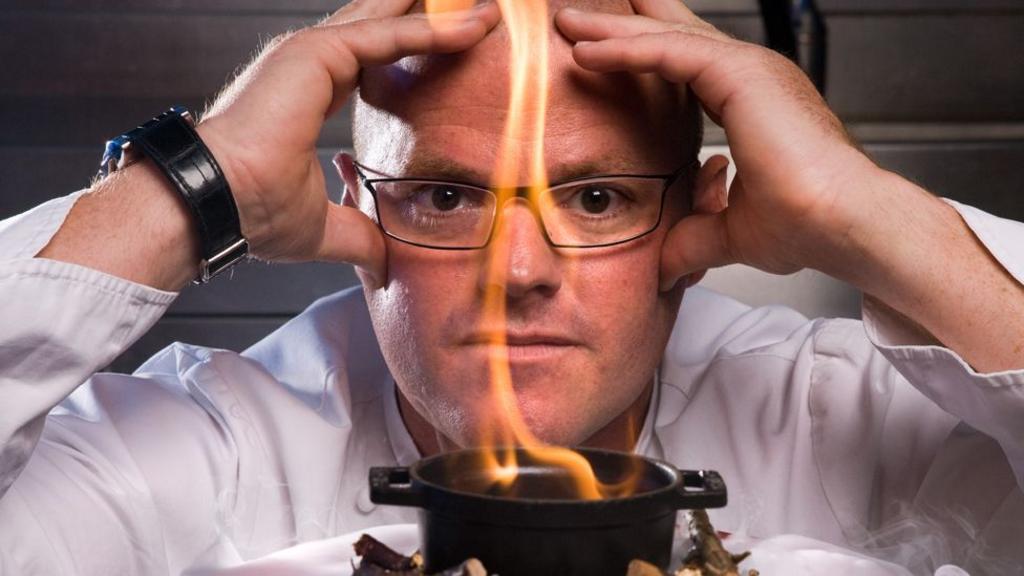“We longed for a simple, relaxed conversation with our dad, but it was impossible,” says Jack Blumenthal. “It was agonizing, and relentless.”
Raw emotion is visible on Jack’s father’s face as he confronts the impact of his undiagnosed mental illness and erratic behavior on his loved ones.
In a new BBC documentary, celebrity chef Heston Blumenthal engages in an emotional conversation with his son, revealing the challenges of living with his illness.
“We’d plan visits weeks in advance, preparing to see you for just half an hour,” says Jack, a restaurateur himself. “And there was nothing I could do to help you.”
Heston wipes away a tear. “I’m sorry,” he says.
At the peak of his fame in the 2000s, Heston Blumenthal was a culinary legend. His bacon-and-egg ice cream, snail porridge, and theatrical dining experiences made him a globally recognized brand. Yet, beneath the molecular gastronomy and Michelin stars, his mental health was deteriorating.
For years, he attributed his emotional volatility to a unique personality.
Heston believed his extreme highs and lows were integral to his creative process, initially fueling his culinary genius. He describes early years of unbridled imaginative energy.
However, his depression deepened, his highs became more intense, and his lows plunged to darker depths.
He recounts needing to “lie on the floor” to cope during a cooking show filming years prior. At one point, he felt overwhelmed by a torrent of ideas, like “thousands of sweets falling from the sky—and I could only catch a few.”
In late 2023, a manic episode culminated in psychosis. Heston experienced hallucinations involving guns and an obsession with death.
His first hospitalization resulted in a diagnosis of bipolar disorder. “How did I reach 57 before receiving a diagnosis?” he reflects.
I recently viewed the documentary, “Heston: My Life with Bipolar,” alongside renowned psychiatrist Prof. John Geddes.
The program includes a 2020 BBC interview where Heston discusses kitchen robots, employing surreal and nonsensical metaphors: “I want to put the shadow back into the sunlight, the inside out back into the outside in… I want to put the being back into the human.”
Prof. Geddes observes that Heston was clearly “in the midst of mania.” “Had I seen this then, I would have immediately recognized a seriously ill individual,” he states.
Heston’s high-pressure celebrity environment inadvertently enabled his erratic behavior. His eccentricity wasn’t just tolerated; it was celebrated. His brand thrived, nurturing his unpredictable genius, supported by a team that managed his functioning. However, this infrastructure was absent at home.
Bipolar UK research indicates that for every person with bipolar disorder, five family members—like Jack—are significantly affected.
“Mania, more than depression, causes family breakdown,” says Prof. Geddes.
Over six months of filming, Heston’s psychiatrists gradually transitioned him from a complex medication regime to lithium.
This wasn’t easy. Medication changes can trigger intense reactions, making Heston’s on-camera experience particularly courageous.
Initially, Heston felt subdued, describing antipsychotics and antidepressants as making him feel “zombified,” his memories clouded.
But his mood improved, his energy returned, and his characteristic charisma re-emerged. Lithium was working—revealing the Heston of previous years.
By the documentary’s end, Heston sought my input on bipolar care research in the UK.
The man I spoke with was unmistakably Heston—still meticulously focused on details like peppercorn ratios—but now calm, focused, and self-aware.
Prof. Geddes wasn’t surprised.
“Lithium is the gold standard, but underutilized in the UK,” he explains. “It requires careful GP and psychiatrist management. The NHS struggles to cope—a reason for declining lithium use, when it should be increasing.”
The UK faces a severe shortage of psychiatrists and mental health professionals, resulting in lengthy patient waits. Diagnosis for bipolar disorder averages over nine years from initial GP contact.
In interviews, psychiatrists described bipolar patients as “ghosts in the system,” “falling through the cracks,” “forgotten,” or “let down.”
Lithium and timely psychiatric access directly correlate to reduced suicidal thoughts in bipolar patients. Suicide rates are rising among those with the illness in the UK, defying downward trends in other suicide statistics.
Heston’s diagnosis only followed a period where he became a danger to himself—hallucinations, paranoia, and ultimately a call to emergency services by his wife.
Despite weeks in a mental health clinic and a year of treatment, Heston wouldn’t undo his bipolar diagnosis. It’s part of him. This encapsulates his journey—learning to live with, not extinguish, the internal fire.
“Bipolar individuals are inseparable from their condition; their personality is intrinsically linked,” says Prof. Geddes. “Treatment doesn’t erase it, but manages mood swings, enabling functioning within their lives—family, friends, work.”
Heston’s journey reflects many others: misunderstood mood swings, delayed diagnosis, and a path toward balance. It’s also a story of self-discovery, resilience, and clarity emerging from chaos.
His culinary career once masked his illness. Now, it provides a platform for his advocacy—and he’s using it.
Heston: My Life with Bipolar will be broadcast on Thursday 19 June at 8pm on BBC Two and will also be available on BBC iPlayer
If you have been affected by any issues in this report, help and support is available at BBC Action Line.
Jen Craft is among MPs calling for urgent improvements to community-based care plans.
Exclusive data shows how neglect of this common mental health condition costs the UK nearly £10bn a year.
Chef Heston Blumenthal says being sectioned was the “best thing” as he dealt with bipolar symptoms.
Torbay’s Bipolar Support Group is celebrating its 30th anniversary.
The celebrity chef announced he was diagnosed with the mental health condition earlier this year.

